Pianovers Meetup #33 was a special one - world renowned Steinway Artist Adam Gyorgy joined us in our usual Sunday evening Meetup!
We also had a Live Interview with him where he humbly shared many of his thoughts. Truly, it was an amazing night to have him walking among us, sharing his musical experiences, and taking photos with our community!
He even performed "Somewhere Over The Rainbow" which brought the night to an all high - because it was a rare opportunity for many of us... See More
Pianovers Meetup #33 was a special one - world renowned Steinway Artist Adam Gyorgy joined us in our usual Sunday evening Meetup!
We also had a Live Interview with him where he humbly shared many of his thoughts. Truly, it was an amazing night to have him walking among us, sharing his musical experiences, and taking photos with our community!
He even performed "Somewhere Over The Rainbow" which brought the night to an all high - because it was a rare opportunity for many of us to see Adam performing live right in front of us, up so close.
A truly special improvement in the piano! With improving materials and technology, instrument makers should make use of the new material characteristics and push the boundaries!
|
|
This is good news! In fact another friend of mine had recently the chance to play on such a piano! |
Many have asked me to unpack the meaning of "music appreciation". When someone asks you, "Are you able to appreciate this piece/genre of music?", what exact does that mean?
Music appreciation has different levels:
First Level: I like that music / enjoy listening to it but I can't explain why.
Second Level: I like that music / enjoy listening to it but I can only explain why I like it in non-musical (layman's) terms.
Third Level: I like that music / enjoy... See More
Many have asked me to unpack the meaning of "music appreciation". When someone asks you, "Are you able to appreciate this piece/genre of music?", what exact does that mean?
Music appreciation has different levels:
First Level: I like that music / enjoy listening to it but I can't explain why.
Second Level: I like that music / enjoy listening to it but I can only explain why I like it in non-musical (layman's) terms.
Third Level: I like that music / enjoy listening to it and I can decipher/analyse why I like it by relating it using music concepts and terms.
Fourth Level: Not only am I of the above (3rd Level), I can also play it if a score is given.
Fifth Level: Not only am I of the above (4th Level), I can also play it by sight-reading and also by ear.
Sixth Level: Not only am I of the above (5th Level), I can also play it by improvising it so that it adopts the style of another genre.
(Source: My synthesis of Reimer's Aesthetics Philosophy, Elliot's Praxial Philosophy & Revised Bloom's Taxonomy)
|
|
Classically trained pianists who learn mainly by reading scores might challenge the order of level 4 and level 5, which of course is another highly debatable topic of its own. Any thoughts? |
|
|
There are two parts to this. First, the defined Level 5 here is not just having the ability to play-by-ear. It refers to those who can sight-read PLUS possessing the play-by-ear ability (dual... See More There are two parts to this. First, the defined Level 5 here is not just having the ability to play-by-ear. It refers to those who can sight-read PLUS possessing the play-by-ear ability (dual skills). In other words, they are progressive in nature. Incidentally, and statistically speaking, there are indeed more who are able to sight-read than those who are able to play-by-ear, thus portraying the right pyramid structure. Second, according to the Revised Bloom's Taxonomy, playing-by-ear is a higher -order thinking skill-set because while a computer can play out a piece of music when a MIDI score is fed onto it, it lacks the ability to play-by-ear (relative pitch, not absolute pitch because the former requires musicality while the latter does not). It is akin to newsreaders who can read a passage extremely well (with good diction and intonation) but are unable to speak well in the impromptu/off-the-cuff sense (when relating an incident). |
|
|
I agree with Yong Meng. For those who can play by ear, most of the time it's pretty effortless (it's an innate talent which can be cultivated further I believe ), whereas playing by score often... See More I agree with Yong Meng. For those who can play by ear, most of the time it's pretty effortless (it's an innate talent which can be cultivated further I believe ), whereas playing by score often takes hard work and concentration (unless of course you can sight read effortlessly :) |
|
|
There are those who can't read music notes but can play a piece by ear even better than one who can read the score ! |
I've just listened to an atonal work. To summarise it in two words, I would use the acronym, "Organised Mess". Please note this has nothing to do with its superiority, beauty or aesthetic level.
|
|
"The Clothed Woman" does have tonal sections! |
|
|
Like schoenbergish atonal? |
|
|
Lol, Zensen's baby piano is a Schoenberg! Ok, I sidetracked. =D |
|
|
Haha, Yong Meng, you do have a photographic memory! |
|
|
Hi Zensen, any details of the above mentioned workshop? |
|
|
Haha I'm conducting it FOC for my cluster schools of music teachers over three Thursday afternoons. As the intermediate level workshop I did for them was well received last year, they requested to... See More Haha I'm conducting it FOC for my cluster schools of music teachers over three Thursday afternoons. As the intermediate level workshop I did for them was well received last year, they requested to go deeper into it. PM me if keen, thanks. |
Above is a link to a short film that depicts what goes on in some parts of our society.
Yong Meng, this is relevant to our discussion regarding why parents stop music learning for academics.
|
|
Wow, that's a nice short animation film! It was sad when the dad finally realises something, and it was too late - the violinist was no longer there. How many times in life have we... See More Wow, that's a nice short animation film! It was sad when the dad finally realises something, and it was too late - the violinist was no longer there. How many times in life have we let chances slip by us in this way - how familiar. |
|
|
This is indeed a touching movie! It unearths a crucial topic in Music & Society - what does our society hold the value/worth/esteem/respect towards the music discipline (as a course of study)... See More This is indeed a touching movie! It unearths a crucial topic in Music & Society - what does our society hold the value/worth/esteem/respect towards the music discipline (as a course of study) and the career of a musician? Why are these not as highly regarded as compared to other areas of study and professions such as medicine, law, banking and engineering? |
|
|
This video portrays the Singapore situation so well ! |
Responding to Yong Meng's request to post the photos of the Bosendorfer grand piano...which has 9 extra keys.. I played on it in 2006 in Toronto. This piano cost C$238,000 back then (see the price tag!). The extra 9 keys are in black in the last photo.
|
|
Is this the Bosendofer 290 Imperial model? |
|
|
Absolutely ... (it says so on the white card). Want to buy one for Pianovers Meetups? :) |
|
|
Lol, the extra keys will be under-utilised. |
One possible future Pianovers Meetup will be at D'Nest condominium's communal music jamming studio. Look at its legend on Club House 3 - Music Nest - they have a jamming studio, a karaoke room, and more! Julia, 全靠你了!
|
|
Wow, a dedicated jamming studio designated by the Condo, which I believe is quite rare in Condos? |
|
|
Yes, only a few developments have that as a feature. |
|
|
This one's also in the far east :D |
|
|
That will be nice :) |
Of late, I've noticed that more and more piano teachers (whom I know personally) are not genuinely passionate about music or music education. They are just treating it as a job (for income purposes), and thus perceiving any musicking activity (e.g. jamming with friends) as an extension to their job (which they would want to avoid). Any thoughts about this?
|
|
Agree with Albert. Full-time music teachers can't afford to sacrifice their source of income for leisure activities. Not taking part in these activities doesn't mean they are not genuinely... See More Agree with Albert. Full-time music teachers can't afford to sacrifice their source of income for leisure activities. Not taking part in these activities doesn't mean they are not genuinely interested in music education. That said, leisure/social music-making does have its place in my life. That's why I have shifted a student to make space for the Pianover's Meetup every Sunday evening. However, other students may not be so accommodating. We all know that piano lessons are usually held at night or on weekends, which is (unfortunately) also the time that leisure and social activities take place. A teacher who cancels lessons because of jamming sessions would not only lose income, but also come across as lacking commitment towards the student. |
|
|
Now I see, thanks for sharing! Anyway a spin-off from this discussion is whether one believes in investments (aka "wasting time to gain time in the future"). While Corrine is willing to "... See More Now I see, thanks for sharing! Anyway a spin-off from this discussion is whether one believes in investments (aka "wasting time to gain time in the future"). While Corrine is willing to "sacrifice" a regular piano lesson slot for attending Pianovers Meetups, she is doing it because of her passion in music and believes in doing this as a form of leisure activity. However, to others, have they ever wondered, by attending Pianovers Meetups, it is actually an investment (though giving up a piano lesson) because through networking, etc., one can garner more piano teaching assignments in the long run? And also possibly learning from fellow piano tutors on how to teach certain aspects which are challenging? |
|
|
Zensen, you do have a point there. Although I participate in Pianover Meetups primarily for leisure and personal growth, I do see it as a way of enhancing one's teaching as well. Thanks for the... See More Zensen, you do have a point there. Although I participate in Pianover Meetups primarily for leisure and personal growth, I do see it as a way of enhancing one's teaching as well. Thanks for the insights! |
|
|
Do piano teachers generally have a more "academic" mindset when it comes to music vs those who have a more "performance-oriented" mindset? Just a thought. (I really appreciate everything my piano... See More Do piano teachers generally have a more "academic" mindset when it comes to music vs those who have a more "performance-oriented" mindset? Just a thought. (I really appreciate everything my piano teachers taught me. :) |
How do you teaching fingering on the piano? Do you advocate a "fixed way" for fingering (as spelled out in the score, especially), or do you train learners to adopt a more flexible approach?
|
|
Both, depends on a situation. The written fingering, when it contradicts the habitual fingering of a student, frequently exposes weaknesses and gives a way to address them (for example, overuse of... See More Both, depends on a situation. The written fingering, when it contradicts the habitual fingering of a student, frequently exposes weaknesses and gives a way to address them (for example, overuse of the third finger when the forth is more appropriate but it's weak and therefore uncomfortable to use). Otherwise the weaknesses would stay hidden and the student would end up with a very limited set of fingering patterns he's comfortable with. |
|
|
Thanks for your sharing! |
|
|
Explaining why music theorists are always lagging behind instrumentalists! |
|
|
Adopt flexible approach due to short or long fingers. In playing different genre of music may requires different fingering techniques. |
How important are graded piano exams?
Feel free to discuss and debate
|
|
Indeed a very interesting topic! |
|
|
Theng Beng, are your kids learning the piano currently? |
|
|
Yong Meng's article has rightly pointed out the downsides of exam-oriented learning (weak sight-reading, limited repertoire and loss of interest which was also mentioned by Theng Beng). But as... See More Yong Meng's article has rightly pointed out the downsides of exam-oriented learning (weak sight-reading, limited repertoire and loss of interest which was also mentioned by Theng Beng). But as Zensen said in the first comment, it ultimately boils down to the learner's objectives or purposes. In defence of exams, these graded assessments are a tangible measure of one's progress, for the learner and for the parent. They are also a source of external motivation, which I believe, has its place alongside intrinsic motivation. Some kids may want to learn certain songs they like very much (e.g. from movies), but because they are unaware of the hard work and commitment needed to master the song, they may also give up eventually. Hence, being "forced" to learn something may not be as bad as it sounds. The practical purposes would be, as Yong Meng mentioned, entry into MEP in schools or DSA, although an audition may also be held. Moreover, if a learner aspires to become a piano teacher, they would need to attain certification. A qualification from an established institution would enable employers to hire in a fair and objective way. If not, piano teachers would likely need to rely on personal connections or word-of-mouth recommendations. |
|
|
I am currently try to 'influence' my eldest daughter who is 10years old to pickup piano. I think she got good height, fingers are Long enough and still flexible. She currently still prefer guitar... See More I am currently try to 'influence' my eldest daughter who is 10years old to pickup piano. I think she got good height, fingers are Long enough and still flexible. She currently still prefer guitar over piano. I always believe piano is the fundamental basic of all musical instruments. Once you knew piano then you could pick up and learn other musical instruments. |
Thank you Vanessa and Mitch for your performance of the theme song from the popular "Bubble Bobble" video game which brings back childhood memories of playing the game.

Since I'm a music theorist, I shall start the ball rolling. Personally, I don't quite like the name of this discipline because it often carries with it a not-so-positive connotation. Why? Generally people would associate it with the learning of (especially) the Western 5-lined stave or notation system (or what we colloquially call it 'the tadpoles' or 'beansprouts').
But we know that Music Theory comprises much more than that - other than notations, it also touches on items such as... See More
Since I'm a music theorist, I shall start the ball rolling. Personally, I don't quite like the name of this discipline because it often carries with it a not-so-positive connotation. Why? Generally people would associate it with the learning of (especially) the Western 5-lined stave or notation system (or what we colloquially call it 'the tadpoles' or 'beansprouts').
But we know that Music Theory comprises much more than that - other than notations, it also touches on items such as harmony, modulations and syncopated rhythms.
Thus, I would prefer to call it 'music concepts'. It is akin to 'salesman' being re-coined as 'sales engineers'.
Closely related to this, the titles of the music arranger and copywriters aren't going a service to what they deserve - people who don't know are likely to misconceive them respectively as "workers who arrange for music events, including coordinating logistics matters" and "workers who copy (or transcribe) what someone articulates orally onto a piece of paper".
Any thoughts to share?
Do you think piano technician/restoration is a diminishing trade in Singapore? Do you think it is a correlation to the number of pianist in Singapore? Feel free to share your observations and experience!
|
|
Haha i prefer the analogy of "car dealer" vs "car mechanic". |
|
|
Jin Li, I also observe that there is no official education route that leads to a piano tuner or piano technician career in Singapore. Consequently, here's a thought: Jin Li, I also observe that there is no official education route that leads to a piano tuner or piano technician career in Singapore. Consequently, here's a thought: If you want to hire a tuition teacher, you might ask for their education certificates to demonstrate the fundamental level of credibility. (Even if he has the paper qualifications, it does not mean he will be a good teacher.) If you want to hire a swimming instructor, you also might ask for his Instructor Certificate before entrusting your kids to learn from him. I think we hire plumbers without knowledge whether he has the certifications or not. This can actually open up another topic: If a person has acquired sufficient experience and expertise to perform his responsibilities and is able to fulfil his duties, does he need to possess any paper qualifications before you will consider him for employment? |
|
|
Corrine - you're right - 'car dealer vs mechanic' is a much better analogy! |
|
|
Yong Meng, interestingly I actually had this discussion with 2 young budding piano technicians. To perfect any skill, the best results come from mindful repetition. Hence the argument is... See More Yong Meng, interestingly I actually had this discussion with 2 young budding piano technicians. To perfect any skill, the best results come from mindful repetition. Hence the argument is whether there is a need to go all out and seek formal education for it (the vocational courses are very expensive), why not just stay in Singapore and apprentice under a skilled piano technician? First reason being lack of apprenticeship opportunities. There are limited piano technicians to begin with, compounded with few are willing to teach for various reasons; some are retired; some are not interested; inconvenient for freelance piano technicians to have an apprentice going around people's houses with them, plus the fact that they might not actually have calls every day. Therefore the only condition match for apprenticeship is probably a 2nd hand piano shop with a piano technician who is willing to teach as that is the only condition where there is an abundance of piano to work on under guidance. Secondly, a formal institute will have a curriculum designed to gain recognition from reputable pianists/organisations, hence apprentice and companies will have confidence in the education provided. I think this applies for all certificates/paper that we gain in any field of discipline. Traditional apprenticeship has more room for questions and doubts for the teaching methods, hence one has to really know the good from the bad to be able to choose the right place to invest their time for learning. With the above being said, "Practice makes perfect" still holds true. A certificate/paper in piano restoration/tuning is only good for the first step forward in the industry, it does not guarantee the quality of work provided. Just my 2 cents. |
Do music need to be technically challenging in order to be superior or aesthetic? This is a highly divided issue in Music Aesthetics. Would like to hear your views and rationale!
|
|
Expressions or interpretations aside, pianists who can run fast passages skilfully (with precise notes and precise rhythm/duration) may perceive that they can play both fast pieces and slow music... See More Expressions or interpretations aside, pianists who can run fast passages skilfully (with precise notes and precise rhythm/duration) may perceive that they can play both fast pieces and slow music with similar precision/accuracy. But others who have difficulty playing fast passages can only play slower works. Thus their argument might be: A sports car can be faster than a regular car, but it can be as slow as a ergular car too, if it wants to be. But a regular car can never be as a fast as a sports car. |
|
|
In fact we are dwelling into a topic that encroaches into social-politics. How do we comfort or encourage someone (who has the aspiration to be a doctor and has been working hard towards it... See More In fact we are dwelling into a topic that encroaches into social-politics. How do we comfort or encourage someone (who has the aspiration to be a doctor and has been working hard towards it throughout his life) who is janitor, because he failed to make it to becoming a doctor or any other white-collar professions? By the same token, we know of several instrumentalist-aspirants who have been learning to master the playing of piano for decades but they can never reach the technically-challenging levels required of most classical piano concertos. What should we be telling this person? Verdi, as we know him, is one of the greatest composers, especially in writing Opera music. But did you know that he was very poor in playing the piano? But his music works are supreme! Which explains I don't agree with Howard Gardner's Multiple Intelligences, which sees Musical Intelligence as one unique factor in mankind. My point here is: While someone is excellent as an instrumentalist but poor at composing, other are the opposite. |
|
|
Zensen: In terms of performing ability, there are more objective methods to measure this. However, if we're talking about composing ability, like what you said, it's a different matter altogether... See More Zensen: In terms of performing ability, there are more objective methods to measure this. However, if we're talking about composing ability, like what you said, it's a different matter altogether. That is why, very few child prodigies grow up to become geniuses who change the world. Because while these prodigies are excellent at playing music or are very knowledgeable in whatever field they're in, they rarely produce anything original. I am neither a concert pianist nor a composer, but I don't consider myself a failed musician because, my mission is to spread the lifelong love of piano music to others, and that's enough meaning and purpose for me. |
|
|
Corrine, well said! If you trust my musical judgement, your performance standard is on par with concert pianists'! |
One item which delights me is that we can now play musical instruments in the MRT train. In the past this was forbidden by law (and spelt out explicitly in small prints at each station).
|
|
Yes, a permit is needed for a person to busk. But if we are simply playing an instrument INSIDE the moving train itself, it is a different scenario altogether. |
|
|
Jin Li, did the accordionist play on the platform, or inside the train? |
|
|
From what I know, I think buskers are only allowed to play on platforms for now. |
|
|
When my car is sent for the next servicing, I'm going to play my recorder, pianica and accordion on the MRT train! |
Visited a piano shop yesterday with Jerome, Gee Yong, and Julia, and tried on a Fazioli.
What are your views on Fazioli pianos?
|
|
Have never tried this piano. But have tried the super grand one with extra keys (in black ) |
|
|
Did that happen in SG? |
|
|
No in Toronto, Canada |
|
|
Nice! If you still have a pic of that, and don't mind sharing; post it here! =) |
Dear pianists, I'd like to ask you all to share about your journey in learning the piano. How and when did you start? What was your highest and lowest point in the journey?
|
|
For me, music was completely self-taught and self-researched. In other words, I don't have any music teacher to date. Like Max, from age 7, I started self-learning music first "by eye" - meaning... See More For me, music was completely self-taught and self-researched. In other words, I don't have any music teacher to date. Like Max, from age 7, I started self-learning music first "by eye" - meaning when my 4th brother had his first Yamaha organ (and he was the one attending lessons at Yamaha), I tried remembering when and where he exactly played which keys/notes and duplicated his playing thereafter. Later, as I self-explored and read more about music theories, I began to develop methodologies for playing-by-ear, and devised my own music theory at age 17. Sad to say, I only had my piano from age 17! |
|
|
I'd say my lowest point was after getting my piano diploma, and the highest point would be when I found Pianover Meetups. Now I'll go into more detail (be prepared for grandmother story)... ... See MoreI'd say my lowest point was after getting my piano diploma, and the highest point would be when I found Pianover Meetups. Now I'll go into more detail (be prepared for grandmother story)... I started showing interest in piano from 6 years old, by playing out the tunes I heard on TV. Parents enrolled me in piano lessons and I went on the conventional ABRSM route. Was pretty motivated until diploma level, where my playing was deemed unmusical. All along my repertoire had been limited to exam pieces, but thankfully the Music Elective Programme in JC offered more opportunities to play duets, 2-piano works, and perform in public. My JC teacher, who was really passionate about music, inspired me to further my music studies at a tertiary level. However, I hit another low point as I started to struggle with the more technically demanding music. I lost confidence as I felt my small hands could not handle the virtuosic Romantic music that sounded so beautiful and impressive. I chose to do a dissertation and gave up practising the piano. It was ironic because as a music grad, I was losing interest in music. And at that time, I was unaware that my piano world was limited to classical music. One day, I chanced upon the piano arrangement of Super Mario Bros (the most popular video game in the 80s) and found I really enjoyed playing it. I began searching for more of such arrangements of video game and movie music, and progressed to doing my own transcriptions. It was at that point (in my mid 20s) that something clicked and I understood musicality! Even my playing of classical works became more musical. But while I was playing those songs I truly enjoyed, I felt something was missing. I wished I could connect with other people instead of just playing them for myself. My wish was granted when I found Pianover Meetups! Participating in the meetups expanded my world. I met people who were self-taught musicians, people who improvised, played by ear and seniors who were still persevering despite their age. I discovered new perspectives and interesting, new repertoire. A big "thank you" to Yong Meng for his vision and dedication! |
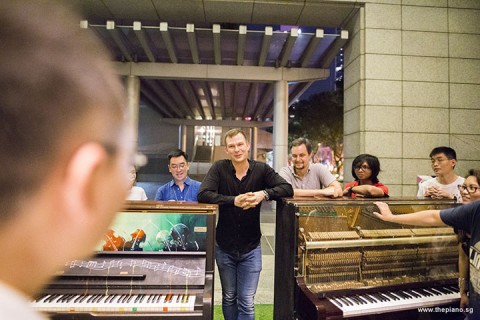

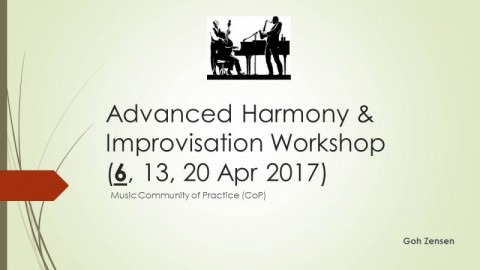
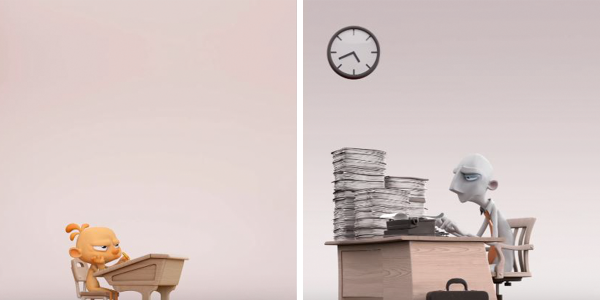
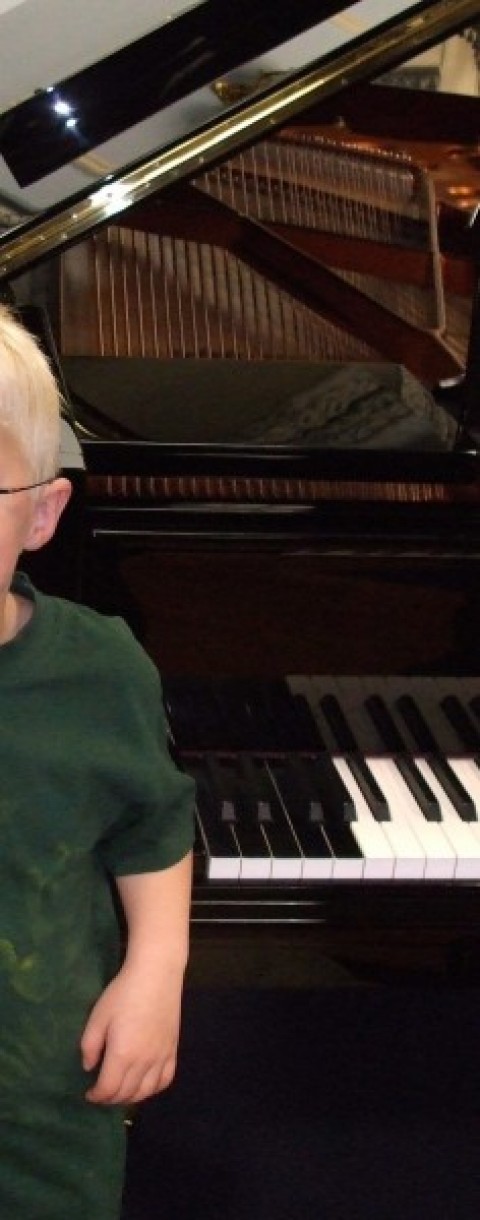
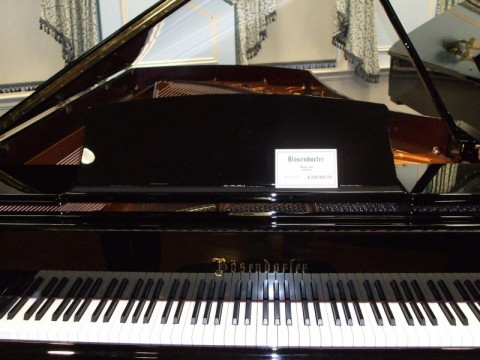
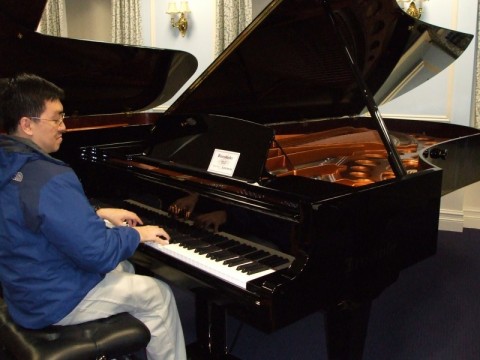

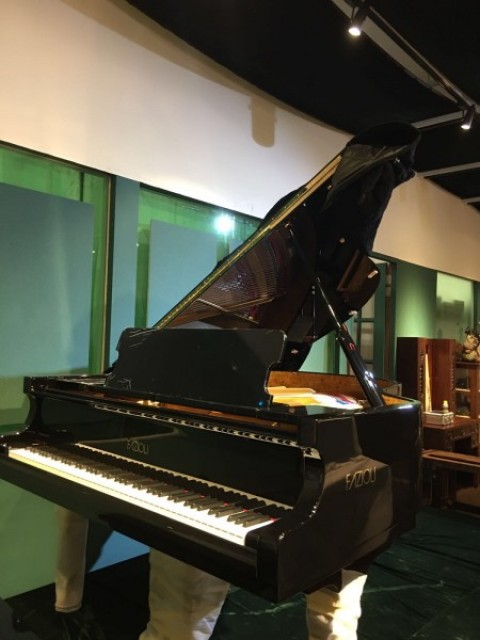
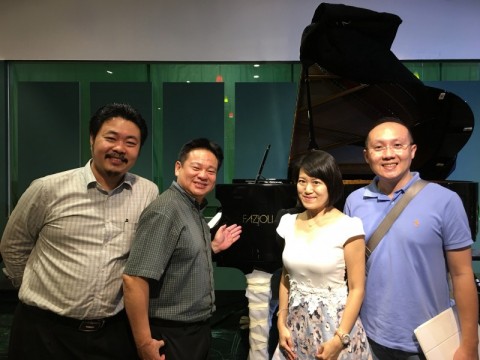
He's really amazing
!
Lol, Alex, I am pleasantly surprised that you wanna pick up classical pieces after getting to know him!
Yong Meng, you meant Alex weren't playing classical pieces before this?
He's into Japanese anime piano arrangements.